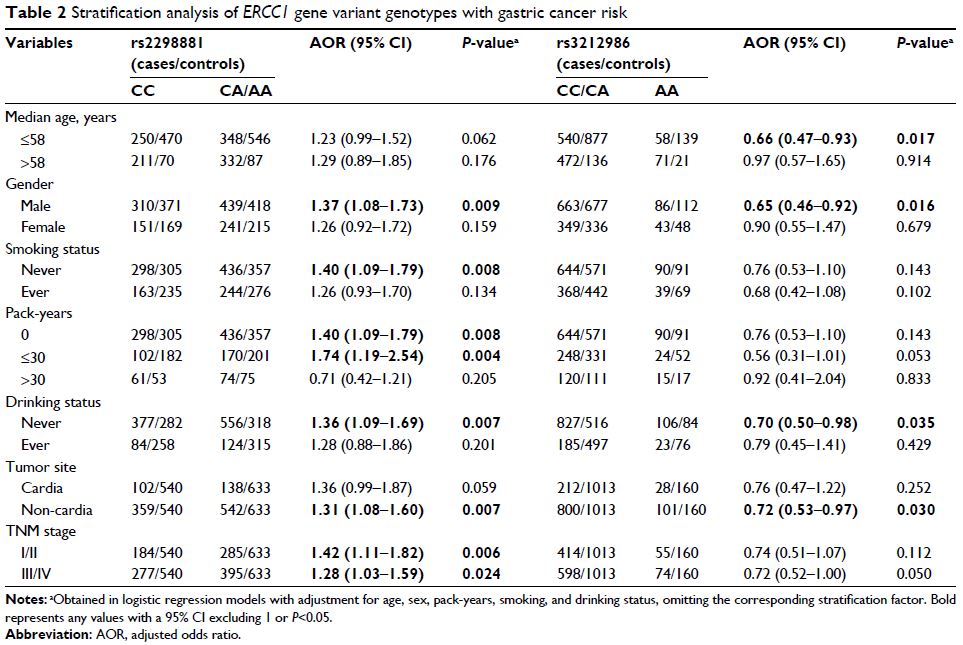108985
论文已发表
注册即可获取德孚的最新动态
IF 收录期刊
- 3.4 Breast Cancer (Dove Med Press)
- 3.2 Clin Epidemiol
- 2.6 Cancer Manag Res
- 2.9 Infect Drug Resist
- 3.7 Clin Interv Aging
- 5.1 Drug Des Dev Ther
- 3.1 Int J Chronic Obstr
- 6.6 Int J Nanomed
- 2.6 Int J Women's Health
- 2.9 Neuropsych Dis Treat
- 2.8 OncoTargets Ther
- 2.0 Patient Prefer Adher
- 2.2 Ther Clin Risk Manag
- 2.5 J Pain Res
- 3.0 Diabet Metab Synd Ob
- 3.2 Psychol Res Behav Ma
- 3.4 Nat Sci Sleep
- 1.8 Pharmgenomics Pers Med
- 2.0 Risk Manag Healthc Policy
- 4.1 J Inflamm Res
- 2.0 Int J Gen Med
- 3.4 J Hepatocell Carcinoma
- 3.0 J Asthma Allergy
- 2.2 Clin Cosmet Investig Dermatol
- 2.4 J Multidiscip Healthc

中国南方人群核苷酸切除修复途径基因的遗传变异与胃癌易感性之间的关系
Authors He J, Zhuo Z, Zhang A, Zhu J, Hua R, Xue W, Zhang S, Zhang J, Li X, Jia W
Received 16 December 2017
Accepted for publication 1 March 2018
Published 12 April 2018 Volume 2018:10 Pages 765—774
DOI https://doi.org/10.2147/CMAR.S160080
Checked for plagiarism Yes
Review by Single-blind
Peer reviewers approved by Dr Andrew Yee
Peer reviewer comments 2
Editor who approved publication: Dr Leylah Drusbosky
Background: Potentially
functional polymorphisms can modulate protein activities and host’s DNA repair
capacity, thereby influencing cancer susceptibility. The association of the
polymorphisms in the nucleotide excision repair core pathway genes and gastric
cancer susceptibility remains largely unknown.
Methods: Here, we systematically analyzed the associations between nine
polymorphisms in four key genes (XPA , ERCC1 , ERCC2 , and ERCC4 ) in the nucleotide excision
repair pathway and gastric cancer risk in a Chinese population including 1142
patients and 1173 controls. Odds ratios (ORs) and 95% confidence intervals
(CIs) were used to estimate the risk associations.
Results: We observed that ERCC1 rs2298881
CA variant genotype was associated with an increased gastric cancer risk (CA
vs. CC: adjusted OR [AOR]=1.33, 95% CI=1.09–1.62; dominant model: AOR=1.32, 95%
CI=1.10–1.60). However, ERCC1 rs3212986
AA variant genotype was identified as a protective factor for gastric cancer
(AA vs. CC: AOR=0.73, 95% CI=0.54–0.98; recessive model: AOR=0.72, 95%
CI=0.54–0.96). Genotype-based mRNA expression analysis further indicated that
the rs2298881 A allele was associated with decreased ERCC1 mRNA expression.
Conclusion: In all, these results indicated that the ERCC1 polymorphisms may
affect the risk of gastric cancer in the Chinese Han population.
Keywords: gastric cancer, DNA repair, NER ,
polymorphism, susceptibility
